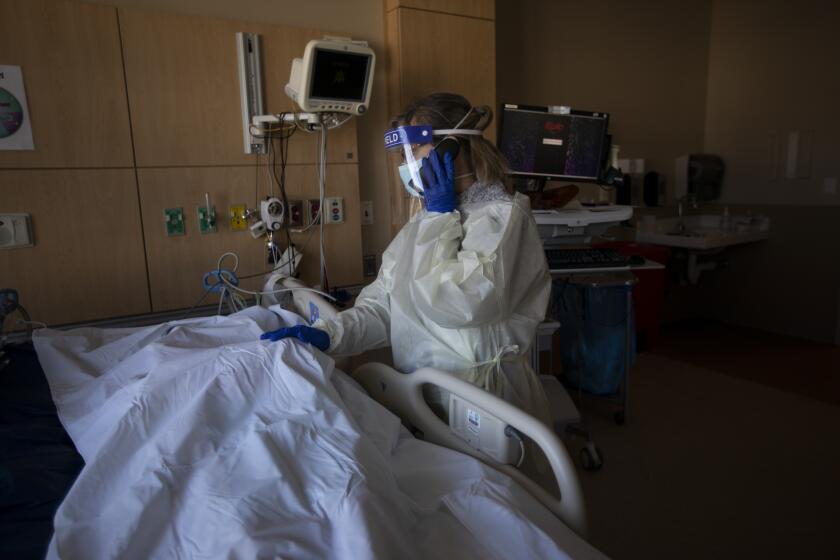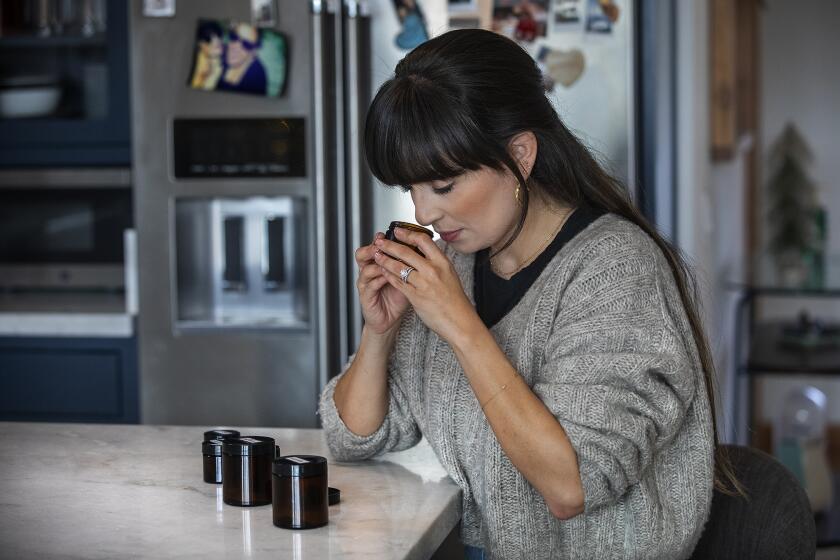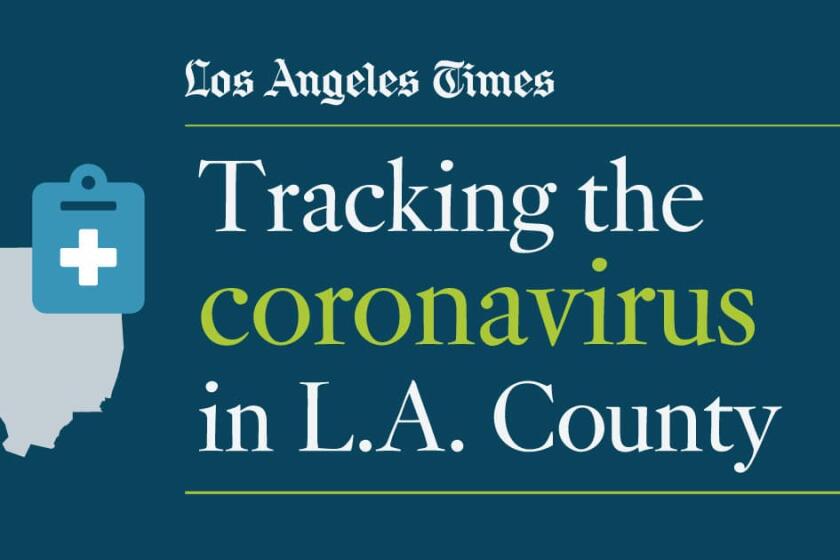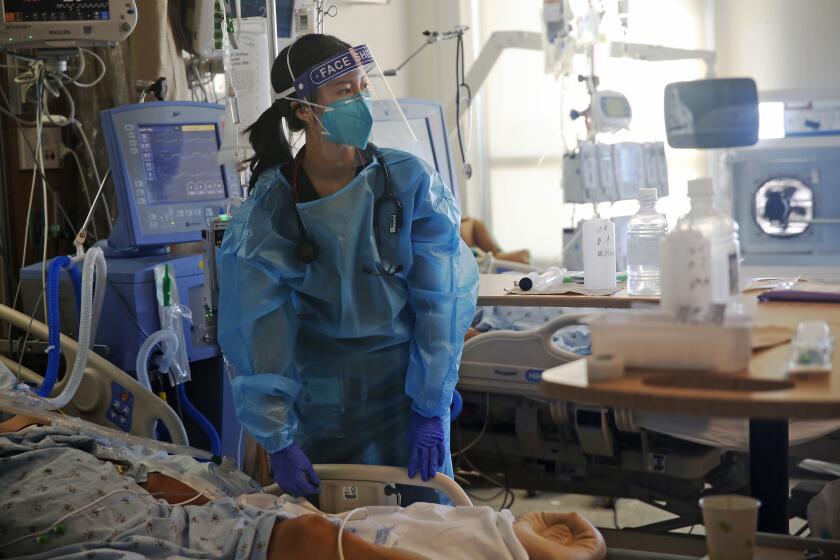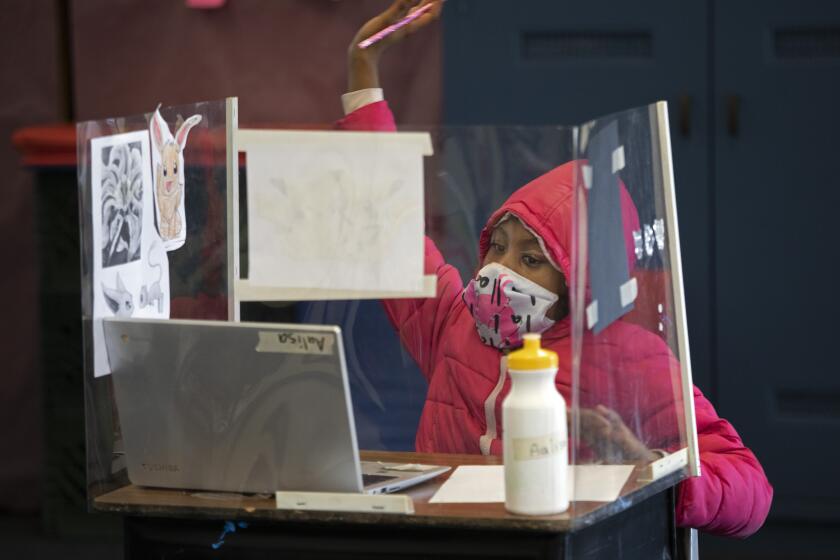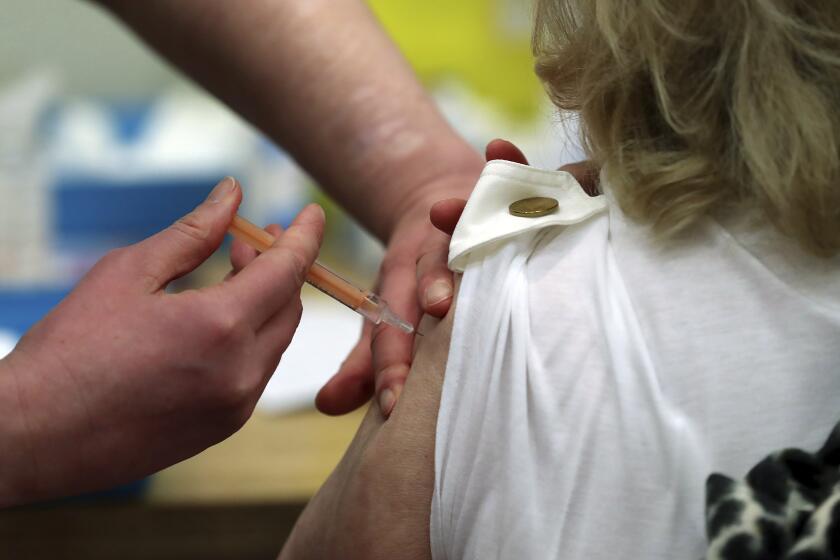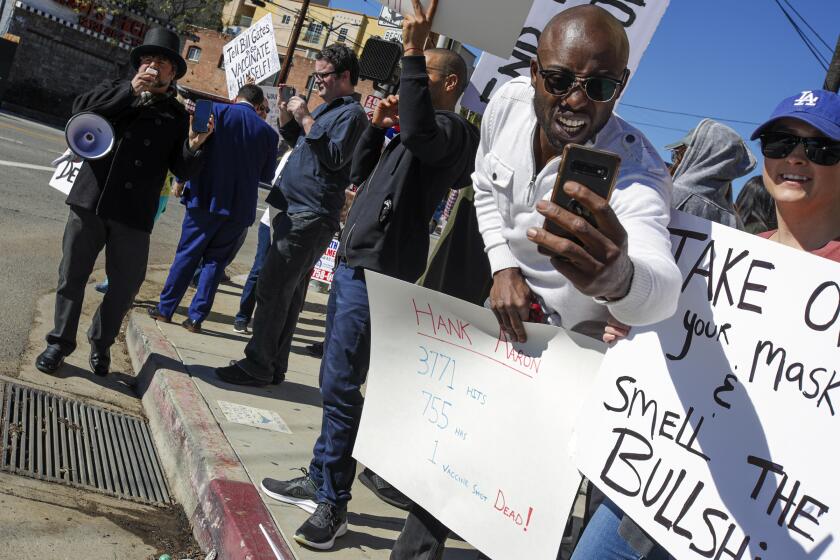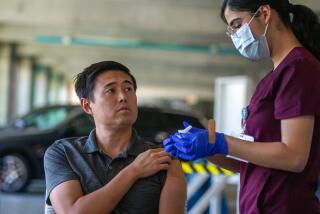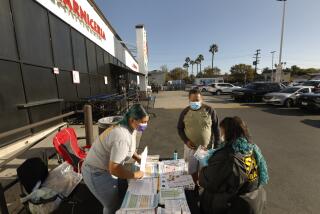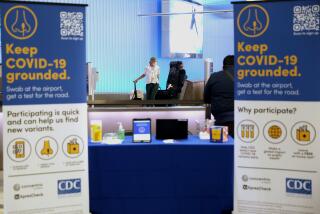COVID-19 in L.A. County finally on a sustained decline after catastrophic winter

The numbers of new coronavirus infections and hospitalizations are nosediving in Los Angeles County, welcome news following a catastrophic winter wave that pummeled the region.
Officials stress, however, that the county is far from out of the woods. Though those figures have tumbled in recent weeks, they remain well above their pre-surge levels — and are still too high for the county to unlock additional sectors of its battered economy or to provide the long-term relief hospitals desperately need.
And the final, most devastating consequence of the pandemic — the number of people losing their battle with the disease — remains high.
About 201 Angelenos, on average, have died from COVID-19 each day over the last week.
L.A.’s coronavirus-related death toll is now above 17,300. Statewide, more than 42,000 Californians have died from the disease throughout the pandemic.
In the first month of 2021, 6,411 people died of COVID-19 in Los Angeles County — 137% more than the previous most-deadly month of December.
Dr. Christina Ghaly, the county’s director of health services, did say Wednesday that it appeared daily COVID-19 deaths had finally peaked.
The highest rate was recorded for the seven-day period that ended on Jan. 14, when the county averaged 241 daily fatalities.
“Although it’s still uncomfortably high, we expect that the average daily mortality will continue to fall in the coming weeks,” Ghaly said during a briefing.
Though the figure is trending in a promising direction, she said the ongoing high numbers of deaths were “heartbreaking — for the families across the county that have lost someone they love, for children that have lost their parents, for parents that have lost children, for people that have lost friends, coworkers, loved ones — that heartbreak is incredibly intense. And that loss is still happening on a daily basis.”
Loss of smell is a common symptom of COVID-19, and about 10% of patients suffer from long-term smell dysfunction. Can the nose be retrained to detect odors correctly?
Deaths are the ultimate lagging indicator of the coronavirus’ reach, taking longer to rise when a new wave hits, and being slower to fall even when the rate of infection sputters.
The pandemic’s pattern plays out because it can take weeks from when they are infected for people to fall ill enough to require hospital treatment, and weeks more for their condition to deteriorate to the point that they need intensive care or die from the disease.
Officials and experts have regularly emphasized that the only way to avoid this devastating domino effect is to curb coronavirus transmission.
L.A. County has seen tremendous, if qualified, improvement in that regard. The county is now averaging about 5,600 new coronavirus cases a day — down significantly from the about 15,100 seen over the seven-day period that ended Jan. 13 but still far greater than in early October, when the county reported fewer than 1,000 cases a day.
That steep drop in infections is starting to be reflected in the region’s hospitals, which have long been deluged with COVID-19 patients.
The latest maps and charts on the spread of COVID-19 in Los Angeles County, including cases, deaths, closures and restrictions.
As of Tuesday, there were fewer than 5,000 people hospitalized with COVID-19 in L.A. County — the lowest such number since mid-December, and down from the peak of 8,098 on Jan. 5. But the number is still far higher than it was in early October, when there were fewer than 700 COVID-19 patients countywide.
“While the numbers are down — and we’re very glad the numbers are down — many hospitals are still having staffing challenges,” Ghaly said. “Many hospitals still have an ICU COVID census that is 100% or more of their normal staffed ICU capacity. And this continues to put a lot of strain on the overall hospital and healthcare system.”
The illness severity of patients in the hospital also remains high, with a disproportionate demand for clinically intensive services such as ICU care and the need to be hooked up to a mechanical ventilator or high-flow oxygen.
“Even though new hospitalizations are decreasing, many of the individuals who were admitted weeks ago have experienced progression of their disease and are now at this point — requiring ICU care and mechanical ventilation even if they didn’t at the earlier stages of their illness,” Ghaly said.
Witnessing so much pain over the last year from the COVID-19 pandemic will likely take a major toll on healthcare workers’ mental health, experts say.
While the county’s progress has been steady as of late, officials warn it could easily be reversed if too many people abandon the public health protocols implemented to stymie coronavirus spread.
Of particular concern is the upcoming Super Bowl. Millions of Californians usually gather to watch the big game — spending hours packed indoors with people they don’t live with to cheer in triumph or howl in defeat.
All that, officials say, is a recipe for disaster, and could ultimately prove a tipping point if too many people misread the recent progress as a sign that the pandemic’s danger has passed.
“Super Bowl parties do have the power to derail our recovery,” L.A. County Public Health Director Barbara Ferrer said Wednesday.
The county still has a slew of coronavirus-related restrictions in place — among them that private gatherings are limited to 15 people, from no more than three households, and must be held outside, with participants wearing marks and maintaining physically distancing.
“So unless your TV screen is outside, if you’re planning to watch the game, you should plan to spend this Sunday with members of just your household,” Ferrer said.
The debate over school reopenings intensifies as pediatricians call for it, city leaders in San Francisco sue for it. Newsom says vaccines for teachers can’t be a prerequisite. Teacher unions push back.
Already, some businesses are failing to adhere to the public health orders that were issued when restaurants were allowed to reopen their outdoor dining areas last week.
In a statement Tuesday, the L.A. County Department of Public Health said that many of those areas were not following orders to have employees who interact with the public wear face coverings, nor were they in compliance with rules limiting how outdoor structures can be set up.
Just as the collective work of Angelenos played a pivotal role in turning the tide, officials warn widespread failure to heed public health guidance represents the most significant potential hurdle on the county’s road to a wider recovery and reopening.
That’s especially the case given the documented presence of new mutations of the coronavirus — including L.A. County’s third confirmed case of the more contagious B.1.1.7 strain that was first identified in Britain.
British scientists are going to test whether different COVID-19 vaccines can be mixed and matched.
“We all have to be cautious and very careful in our actions to avoid another surge, another storm to come upon us,” Ghaly said. “An increase in the behaviors that lead to more transmission of this virus in our community could very easily result again in the return of the surge in our hospitals, and in an increase in the number of patients that are requiring hospitalization in just two or three weeks’ time.”
Even without the more-easily-spread strains, Ferrer said Angelenos are already intimately aware of how quickly COVID-19 can rage out of control — and how seemingly benign activities can add fuel to the viral wildfire.
“Let’s not take any chances,” she said. “There are countless stories … where one group of friends or multiple families got together, and within weeks, many people were infected, some are hospitalized and someone died.”
The organizer behind the Dodger Stadium vaccine protest said the group didn’t mean to shut it down. Buoyed by the attention, he vows more to come.
Improving conditions in L.A. County reflect a rosier statewide trend, as California continues to emerge from the darkest days of the pandemic.
New daily case numbers are falling rapidly across the state. State officials on Tuesday announced that 18 counties — including San Francisco, Santa Clara, San Mateo, Marin and Yolo — were seeing rates below 25 new daily coronavirus cases per 100,000 residents, which would allow additional K-6 schools to begin reopening for in-person instruction.
Hospitalizations have also cratered, from a peak of nearly 22,000 in early January to 13,766 on Tuesday.
“Everything that should be up in relationship to this virus is up,” Gov. Gavin Newsom said Wednesday. “Everything that should be down is down.”
More to Read
Sign up for Essential California
The most important California stories and recommendations in your inbox every morning.
You may occasionally receive promotional content from the Los Angeles Times.
